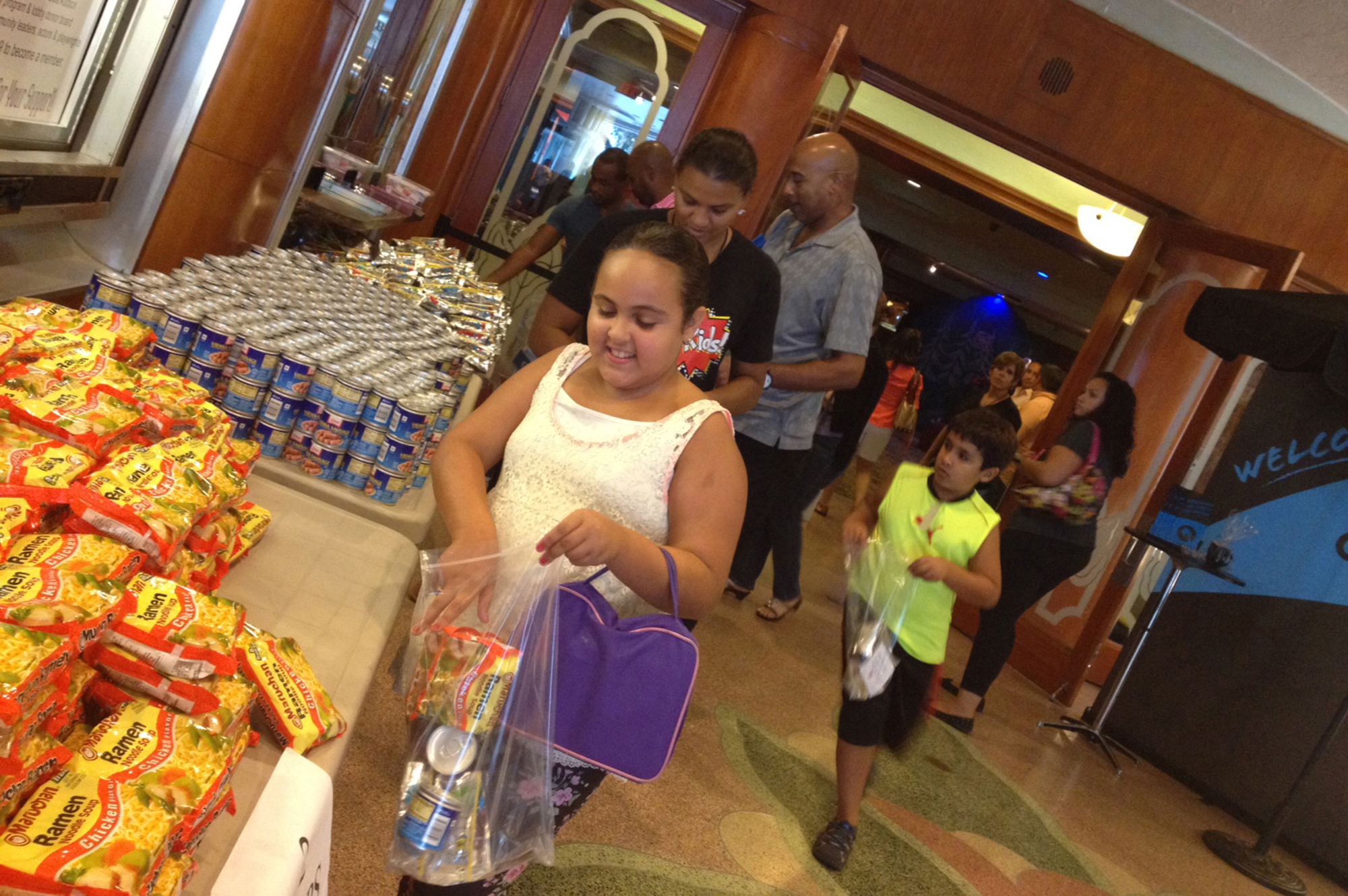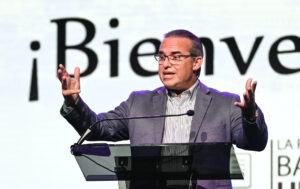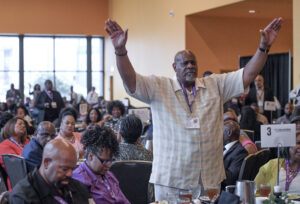
MIAMI (BP) — Every weekend, 830 children in Dade County have food to eat because Christ Fellowship in Miami sent it home with them from school.
The 830 students, who receive easy-to-prepare food in backpacks stuffed by concerned volunteers, are only a fraction of the estimated 30,000 hungry children in South Florida, according to Christ Fellowship ministry leaders.
The seven campuses of the 9,000-member church contribute funds and volunteer staffing to keep children fed when their schools do not offer free breakfasts and free or reduced-cost lunches. The smallest of the church’s campuses, Redlands, stuffs 50 backpacks. The largest campus, Palmetto Bay, prepares 310. Volunteers from the campuses deliver bags of food to schools near their church site.
[VIMEO=102837896]The outreach began a year ago when Christ Fellowship provided 450 backpacks for students. By the end of the 2014-15 term, ministry leaders estimate the number will grow to 1,200.
“When we started this, we did not imagine how big it would get,” said Jorge Molina, the former missions pastor who headed the program until he became the church’s small groups pastor.
“This takes a lot of energy, but the huge need creates the energy you need,” Molina said. “This is a beautiful thing that God is doing. Our folks love this program.”
Backpack program director Panos Kourtesis now oversees logistics for purchasing, storing, packing and distributing food to 20 public schools in all corners of the city. The church also covers cost, an estimated $200 per child per year, said Aimee Artiles of the church’s arts and communication team.
“We do thousands of what we call ‘Reach Beyonds’ every year, but for this, everybody has come to the table to help. It has been a blessing to us and to the children,” she said.
Christ Fellowship’s annual Night of Worship became a fundraiser for the backpack program. The August celebration had been free to all in the past, but $10 admission tickets were sold this year to benefit the feeding program. Church members and guests sold out the 1,500-seat worship center on the Palmetto Bay campus. Many worshippers watched a video about the backpack program through tears, Artiles said.
“Their generosity was abundant,” she said.
The ministry has distribution centers at the downtown campus that serve church campuses in the north of the county and at the Palmetto Bay campus that serve locations in the south. Food items are moved to church campuses prior to “packing parties” during which volunteers pack gallon-size Ziploc bags to be placed in the backpacks. In each bag are items for two breakfasts (breakfast bars), two lunches (Vienna sausage, canned ravioli, etc.) and two dinners (ramen noodles, canned soup, etc.), two snacks and two boxed drinks.
The packing parties are places for the church’s children and youth to be involved in the feeding program. Molina said his 4- and 5-year-old children “love to do this.”
Kourtesis, who began as a volunteer packing food a year ago at the Miami Springs campus, said the ministry experienced “a learning process” in purchasing appropriate food items. Every food item has to have a long shelf life because a six-week supply of packed bags is always on hand. Also, food has to be “peel and open” and “add water” because many children “are taking care of themselves” on the weekend, he said. One family meal, usually pre-packaged fortified macaroni and cheese, also is included.
“What we found heartbreaking is that many of the kids are homeless or live in hotels. They do not have access to microwaves or milk,” Kourtesis said.
He said a needy family will spend its funds on fixed expenses first — rent, utilities, gas and car insurance so they can get to work. Any leftover money may be spent on food.
Kourtesis identifies with the children and families that the ministry serves. He and his siblings watched their single mother struggle to provide for the family after a house fire destroyed everything they owned.
“As a child, I would have been in this program,” Kourtesis said. “It would have been extremely helpful.”
The students’ confidentiality is protected at every step in the process, since they “don’t want the other kids to know they are getting food,” Kourtesis said. Each child is recommended to the feeding program by a school counselor. The children pick up backpacks as they leave on Friday afternoon and return the bags on Monday or Thursday.
The church does not know the names of those receiving backpacks unless a child’s parents sign up for Thanksgiving and Easter meals that church volunteers deliver to their homes. A toy collection at church and a $1 sale of the items let parents have the dignity of saying, “I bought this for you.”
“At these occasions we can pray with the families and let them know that we are here to support and love them because Christ loved us first,” Kourtesis said. “We are doing all this because we are trying to change our broken city.”
The church also offers families meals during the summer months. Families may pick up meals on Friday afternoons at their schools, Artiles said.
The backpack program grew out of longstanding relationships between the church and public schools located near the church’s campuses. Molina said church leadership became aware of need in the schools about nine years ago when news outlets reported that the county’s public schools were operating in the red.
“They asked the students to bring in copy paper for the offices to use, and we thought, ‘Are things that bad?’ That was our first gift to schools. We bought copy paper for the schools around our campuses,” he said.
Casual contact with school administrators gave chances to ask what else the schools needed. Along the way, Christ Fellowship members mulched flower beds, painted walls, picked up trash and cleaned bathrooms.
“We had to go to them without an agenda — just to ask ‘How can we serve?’ We could not be presumptuous,” Molina said.
Volunteers began hearing from administrators and teachers that students arrived at schools on Monday mornings ravenously hungry. The backpack program subsequently was born out of the church’s and pastor Rick Blackwood’s concern, Artiles said.
With the explosive growth of the backpack ministry, Molina said ministry leaders are now looking beyond the church for help from businesses, other Miami churches and other organizations. Florida International University has adopted Christ Fellowship’s backpack program to benefit from its gate receipts for football games.
“This is a need that even non-Christians can recognize,” Molina said.
Churches of any size in any city can become involved in feeding children in their own local schools, just by packing food for 10 kids, he said.
“This is the Gospel in action. We always want to present the Gospel because that is what will change their lives. It’s as simple as it gets,” Molina said. “The children know that a church loves them.”
For more information and a video about the program, visit cfmiami.org/backpacks.
To start a backpack ministry
— Understand the need.
Find out how many Title I schools are in your community. Title I schools have at least 75 percent of their students receiving free or reduced lunches. In some Miami-Dade schools, 99 percent receive free meals, Molina said.
— Visit your local public schools. Ask, “What do you need help with?” Ask if hunger is a problem for students.
— Get to know the members of your county or city school board. “School board members can open doors for you in the schools,” Molina said.
— Purchase backpacks and price food items. Backpacks may be purchased for about $5, Molina said.
— Present the need to church leadership and members. The beginning step may as simple as providing families a list of “extra” items to purchase on a trip to the grocery store, Molina said.
— If the church adopts the ministry, enlist volunteers, including children and youth who can be involved in the packing process.
















